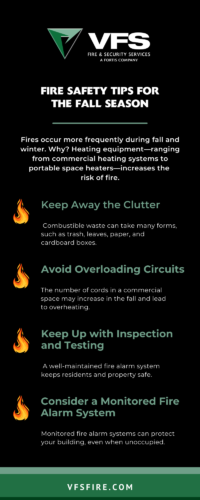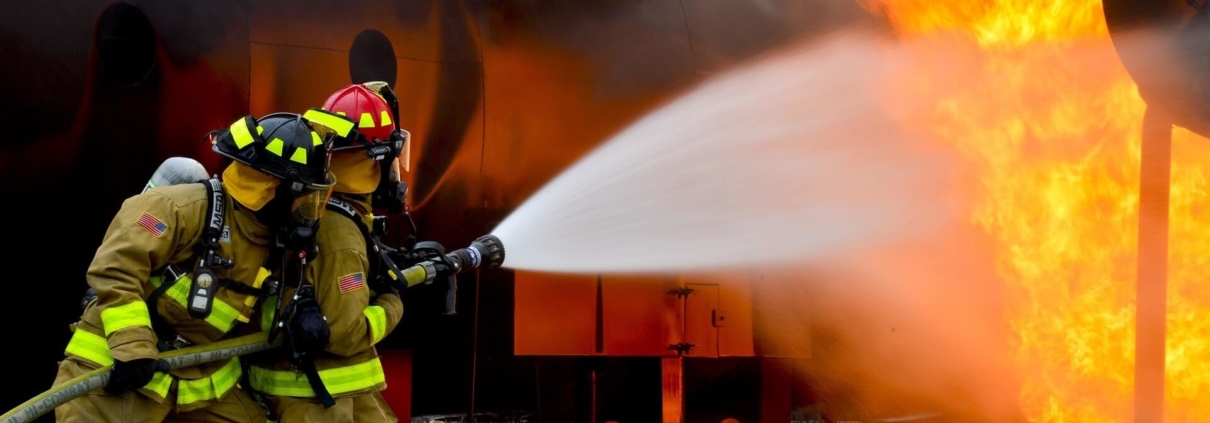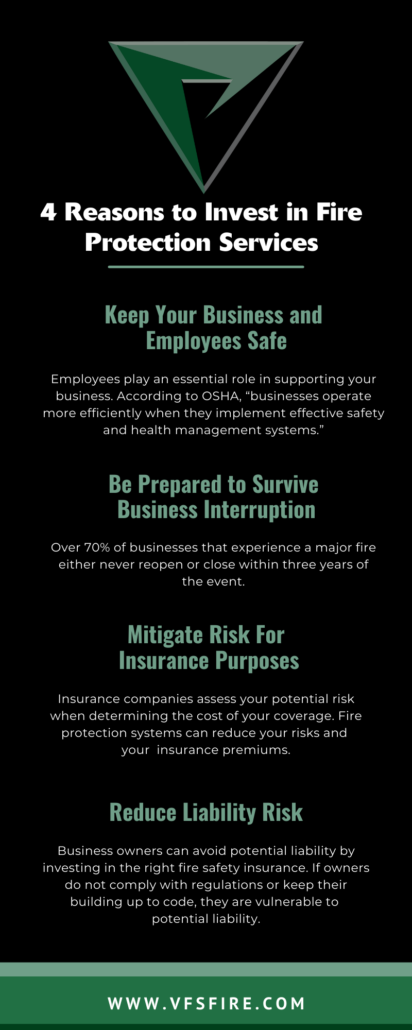Fires can happen anytime but occur more frequently during fall and winter.
Why? Heating equipment, ranging from commercial heating systems to portable space heaters, increases the risk of fire. Additionally, candles, decorations, and cooking contribute to this increased risk.
Don’t worry, you don’t need to put out your favorite pumpkin spice-scented candle or take down those new decorations! We’re here to discuss some fire safety tips to help protect your building during the fall.
Let’s dive in.
What Are the Most Common Causes of Fires?
According to the National Fire Protection Association, the five most common causes of fires in commercial buildings are:
- Cooking Equipment
- Heating Equipment
- Electrical and Lighting Equipment
- Smoking Materials
- Arson
How to Reduce These Fire Risks
Commercial property owners can use a few strategies to prevent building fires.
1. Keep Away the Clutter
Clutter can quickly become combustible waste and serve as fuel for fires. Combustible waste can take many forms, such as:
- Trash, including cardboard boxes, paper, or cartons
- Debris
- Plant matter
- Yard trimmings
- Fallen trees
- Wood
- Leaves
Fire laws prohibit the accumulation of these items anywhere except intended disposal locations. Without proper treatment, such combustible waste can become a significant fire hazard for your building.
Additionally, clutter can block exits and evacuation routes as well as make it more difficult for firefighters to do their job in the event of a fire.
Owners should make an effort to keep the building free from obstructions and keep hallways clear.
Learn How to Store Combustible Waste
We get it—you can’t keep combustible waste off of your property at all times. Instead, you can store this waste safely to improve fire safety.
Property owners should:
- Keep storage containers away from the building
- Storage containers near facilities shouldn’t contain oily rags or other unsafe materials without proper container identifications
- You must use lids on containers 40 gallons or greater
- Keep containers exceeding a capacity of 40.5 cubic feet outdoors and over five feet away from construction work
Additionally, OSHA provides guidelines you can follow for storing combustible waste, such as:
- “All solvent waste, oily rags, and flammable liquids shall be kept in fire-resistant covered containers until removed from the work site.
- All scrap lumber, waste material, and rubbish shall be removed from the immediate work area as the work progresses.
- Whenever materials are dropped more than 20 feet to any point lying outside the exterior walls of the building, an enclosed chute of wood, or equivalent material, shall be used.
2. Be Aware of Ignition Sources
Other items can also contribute to fire hazards. Ignition sources include heaters, lamps, and other items that can get hot or cause a flame (i.e. exposed cords or electrical outlets).
Other possible sources of open flames include the following:
- Matches
- Cigars and cigarettes
- Signal markers
- Flaming food and drink preparations in restaurants
- Decorative devices
- Candles and lanterns
- Gas heaters
- Barbecue pits
3. Post an Evacuation Plan
In the event of a fire, a well-executed evacuation plan can provide many benefits, such as saving lives and allowing emergency services to do their jobs easier.
Property owners can post evacuation plans in public areas to familiarize residents and employees with safety precautions.
4. Avoid Overloading Circuits and Extension Cords
Many commercial buildings, such as office spaces, have an abundance of cords. Outlets become crowded due to monitors, computers, printers, and other devices.
With the addition of items such as portable heaters in the fall, the number of cords in a commercial space may increase and lead to overheating.
Property owners should encourage residents to check the fit of the plug in the outlet and avoid loose electrical connections. A poor connection may cause overheating or a fire.
5. Ensure You Have Correct Safety Equipment
Property owners should ensure they have the correct safety equipment for their building. Additionally, to reduce the increased risk of fire during fall, owners should take the time to locate fire extinguishers and replace batteries in smoke alarms.
6. Keep Up with Inspection and Testing
Inspection and testing of fire suppression systems are crucial. To comply with NFPA 72 regulations, inspection, testing, and maintenance of your fire alarm system are required on a semi-annual basis. A well-maintained fire alarm system keeps residents and property safe.
What is a Fire System Inspection?
A fire inspection is a process in which the fire department inspects a building or property to identify and access potential fire safety hazards.
How Often Should Fire Systems Be Inspected?
According to the NFPA code, inspections of your fire and life safety systems are required to occur on a quarterly and annual basis.
Read on to learn about understanding inspections and maintenance for your building.
7. Consider a Monitored Fire Alarm System
A monitored fire alarm system can help prevent costly damage to your property while protecting its residents.
What is a Monitored Fire Alarm System?
A monitored fire alarm system is an alarm system that has been programmed to transmit signals to a central station or fire control center.
In simple terms, when the alarm goes off, the system will immediately alert an operator who will dispatch the appropriate fire protection team to your building.
What is the Difference Between a Fire Alarm System and Fire Alarm Monitoring?
Unlike a monitored fire alarm system, a fire alarm system sets off an alarm—usually a series of local, audible devices—to alert people in the building that a fire has been detected and to evacuate immediately. A fire alarm system does not notify the fire department of the detected fire. The fire department will not be dispatched unless someone calls 911.
As we approach the fall and winter months, the risk of a fire occurring in your building rises. However, monitored fire alarm systems can help to protect your building and its residents, even when it is unoccupied.
Read on to learn more about monitored fire alarm systems.
Is It Time for Your Building to Be Inspected?
Ensure your building is safe and up to fire protection code compliance by partnering with a company that specializes in fire protection. Start a conversation with us today and let’s figure out how to best protect your building.






